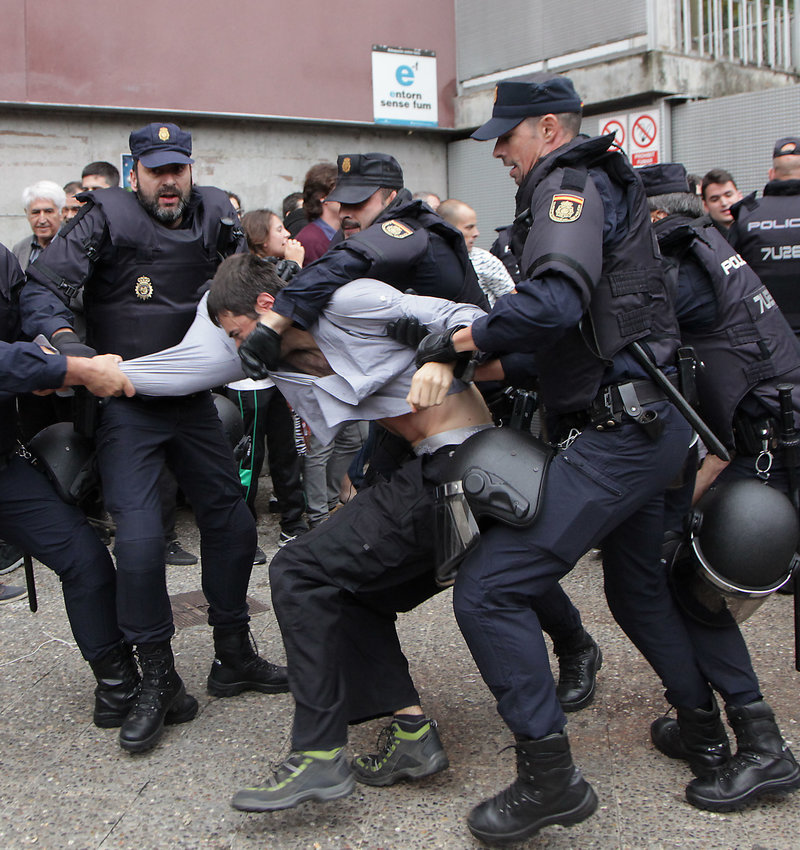Test of independence
Arguably Catalonia has been the utmost test to Spanish democracy in the past 40 years. Madrid has faced the Catalan problem using an old regime manual, far from the standards in today’s Western democracies. Contrast the political prisoners and exiles (around 100 to date), and the mass beatings and brute force used by Spanish police (on several occasions, the worst being the more than 1,000 injured during the independence referendum of October 1, 2017), with Spain’s abiding, apparently, to the EU’s core values of equality, rule of law and human dignity. Here it is worth mentioning an insight from Mr Jordi Barbeta, a veteran Catalan journalist: Spanish negotiators during its accession to the EU accepted all clauses, to the surprise of Brussels’ negotiators. In fact, signing was one thing, committing to them another.
Another arena being tested concerns international public opinion. Sadly, we have realised how concealing Madrid’s violation of basic rights in democracy is far too common in the international mainstream media. It has been difficult for many to face the crude reality of a country once taken as an example of transition from authoritarianism to full democracy. To add to this, most international correspondents living in Madrid infers an ineluctable conflict of interest: due to the huge bias of the news they source from (almost all of them aligned to the central power’s dictates regarding Catalonia), but also vis-à-vis the politicians or public pundits whom they relate to daily.
By contrast, full democracies such as Germany or the UK face constant deep and serious scrutiny by the media and public opinion, local and foreign alike. Possibly, because there are no political taboos there, and criticism does not spur the hysterical reaction common in Spanish politics when confronted with the Catalan issue. On this lack of a “good sporting” spirit, at least in politics, Mr Aleix Sarri, a promising young Catalan politician, cunningly commented recently that Francoism, rather than an exception, should be regarded as one of the many manifestations of Madrid’s inherent authoritarian and jingoist nature of ruling. Ortega y Gasset, a renowned Spanish philosopher of a century ago, named this mindset as of “ordeno y mando” (command-and-control).
Finally, there is an intriguing test on democracy itself, for how much would it be worth? Catalonia is proof that the basic foundations of democracy are being perverted: from the separation of powers to equality before the law. Yet, intriguingly, only a few Spaniards have opposed the hard-line politics from Madrid on Catalonia. To this, Spanish media and politicians alike have played a key role, by demonising, and even dehumanising, Catalans altogether. As my colleague Eduard Gracia has evidenced in the previous issue, Catalanophobia is largely Spain’s own version of antisemitism, so Catalans all too often are described as “selfish”, “retarded”, “vicious” and (supreme sarcasm) “nazis”. In fact, Catalans are the perfect scapegoat for the standard Spanish politician, without any reputational or credibility costs.
But this may only be a factor...outsiders light-heartedly say that Spaniards are happy being credited only with tapas, beer and sun. Indeed, for that matter, many a foreigner is just happy with that when holidaying in Spain. Granted, this seems over simplistic; nonetheless, after watching events, it may not be that far from the truth. Otherwise, it is hard to explain them accepting so many blatant lies, hoaxes, and even incompetence from their top civil servants, including the king. Some have even wondered if the Catalan conflict is not rather showing the frontier between a democratic culture and an authoritarian one.
Authors’ original title: Catalonia’s way to independence is pointing out some tests…at once

